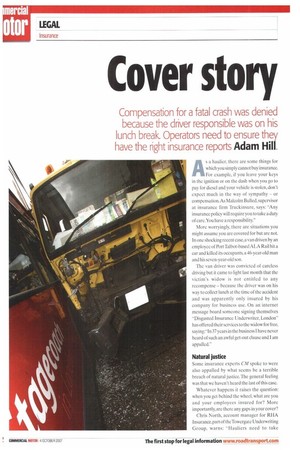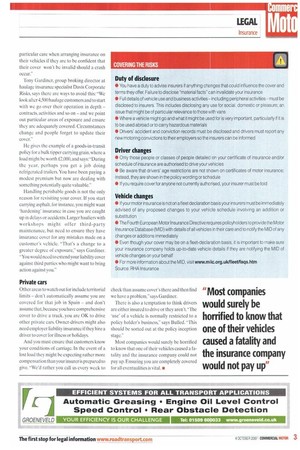Cover story
Page 32

Page 33

If you've noticed an error in this article please click here to report it so we can fix it.
Compensation for a fatal crash was denied because the driver responsible was on his lunch break. Operators need to ensure they have the right insurance reports Adam Hill
As a haulier, there are some things for which you simply cannot buy insurance. For example, if you leave your keys in the ignition or on the dash when you go to pay for diesel and your vehicle is stolen, don't expect much in the way of sympathy — or compensation. As Malcolm Bulled, supervisor at insurance firm Truckinsure, says: "Any insurance policy will require you to take a duty of care.You have a responsibility."
More worryingly, there are situations you might assume you are covered for but are not. In one shocking recent case,a van driven by an employee of Port Talbot-based ALA Rail hit a car and killed its occupants, a 46-year-old man and his seven-year-old son.
The van driver was convicted of careless driving but it came to light last month that the victim's widow is not entitled to any recompense — because the driver was on his way to collect lunch at the time of the accident and was apparently only insured by his company for business use. On an internet message board someone signing themselves "Disgusted Insurance Underwriter, London" has offered their services to the widow for free, saying:"In 37 years in the business I have never heard of such an awful get-out clause and I am appalled."
Natural justice
Some insurance experts CM spoke to were also appalled by what seems be a terrible breach of natural justice. The general feeling was that we haven't heard the last of this case.
Whatever happens it raises the question: when you get behind the wheel, what are you and your employees insured for? More importantly, are there any gaps in your cover?
Chris North, account manager for RHA Insurance,part of theTowergate Underwriting Group, warns: "Hauliers need to take particular care when arranging insurance on their vehicles if they are to be confident that their cover won't be invalid should a crash occur."
Tony Gardiner, group broking director at haulage insurance specialist Davis Corporate Risks, says there are ways to avoid this: "We look after 4,500 haulage customers and to start with we go over their operation in depth contracts, activities and so on and we point out particular areas of exposure and ensure they are adequately covered. Circumstances change and people forget to update their cover."
He gives the example of a goods-in-transit policy for a bulk tipper carrying grain, where a load might be worth .£2,000, and says: -During the year, perhaps you get a job doing refrigerated trailers. You have been paying a modest premium but now are dealing with something potentially quite valuable."
Handling perishable goods is not the only reason for revisiting your cover. If you start carrying asphalt, for instance, you might want 'hardening' insurance in case you are caught up in delays or accidents. Larger hauliers with workshops might offer third-party maintenance, but need to ensure they have insurance cover for any mistakes made on a customer's vehicle. "That's a change to a greater degree of exposure," says Gardiner. "You would need to extend your liability cover against third parties who might want to bring action against you."
Private cars
Other areas to watch out for include territorial limits don't automatically assume you are covered for that job in Spain and don't assume that, because you have comprehensive cover to drive a truck, you are OK to drive other private cars. Owner-drivers might also need employer liability insurance if they hire a driver to cover for illness or holidays.
And you must ensure that customers know your conditions of carriage. In the event of a lost load they might be expecting rather more compensation than your insurer is prepared to give. "We'd rather you call us every week to check than assume cover's there and then find we have a problem," says Gardiner.
There is also a temptation to think drivers are either insured to drive or they aren't. "The 'use' of a vehicle is normally restricted to a policy holder's business," says Bulled, This should be sorted out at the policy inception stage."
Most companies would surely be horrified to know that one of their vehicles caused a fatality and the insurance company could not pay up. Ensuring you are completely covered for all eventualities is vital. NI


























































































































































































